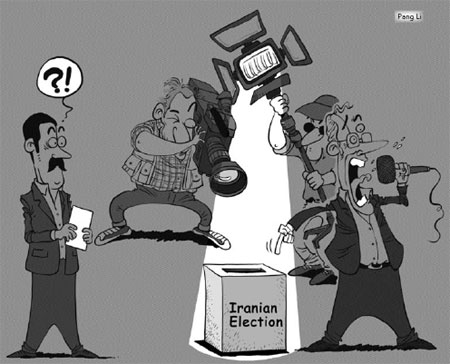
|
OPINION> OP-ED CONTRIBUTORS
 |
|
Why doesn't the media leave Iran alone
By Huang Xiangyang (China Daily)
Updated: 2009-06-26 07:53 The Western media are excited in their obsession with Iran. CNN, BBC, VOA, some other news channels and many Western newspapers haven't even bothered to look for headlines news for the past several days because Iran has been there, undergoing a "new revolution". What is happening in Iran - on the surface - has all the juicy elements that appeal to Western minds: a "rigged election", violence, bloodshed and a quest for freedom and democracy. A "color revolution" on the model of Georgia or Ukraine is taking place, the Washington Post has declared gleefully. News channels, newspapers and websites are scrambling with each other in the one-upmanship game of "we brought it to you first". Years ago Phillip Knightley wrote in his The First Casualty: the first casualty in a war is truth. It's the truth, or the whole truth, that has been missing from most of the reports coming out of Iran because the Western media seem to have given objective reporting an unceremonious burial. At times inadvertently but most of time intentionally, such reports tend to use simplistic ways to interpret the complicated situation in Iran as a rivalry between good and bad people, a struggle of the weak against the powerful, and the rising up of Iranians against "authoritarian" rule. For the West and its media, the line in Iran is distinctly demarcated. Iran is "a ruthless regime". It has been "financing and exporting extremism and terror". Its government is supported by the Revolutionary Guard, which is prepared to crush any opposition. The Revolutionary Guard is a "specially designated global terrorist" organization involved in "smuggling, building Iran's nuclear program, and supplying the weapons that have been killing a growing number of US soldiers in Iraq". On the other side of the line are unarmed people defying gun-toting soldiers. These people are "protesting against lies and fraud" and "seeking democracy and freedom". Their latest icon and inspiration is a young woman known as "Neda", who died in the post-election protests. Amateur video has captured "Neda's" death. She is shown lying on the ground with blood flowing from her mouth and nose. CNN and other news channels have broadcast the image. The Internet is awash with it, too.
 Death of an innocent is always a tragedy, and has to be condemned in no uncertain terms. But it is still not clear who shot her: a soldier, a militant or one of the protesters? Or, was she a victim of misfiring? Time magazine, nonetheless, has declared that her death "may have changed everything". One cannot but wonder what really is behind this blatant anti-Iran melodrama. It is well known that the CIA had a plan to destabilize Iran. On May 23, 2007, ABC News cited the then existing and former US intelligence officials to report: "The CIA has received secret presidential approval to mount a covert 'black' operation to destabilize the Iranian government." The plan may be the CIA's "democratize-the-world program", but it's painful to see a section of the media taking the bait hook, line and sinker. What's surprising is that these media groups are no longer playing the game covertly while covering the protests, which has all the hallmarks of the CIA-orchestrated protests in Georgia (2003) and Ukraine (2004) during the so-called rose and orange revolutions. For those who still have doubt, here is some food for thought. The New York Times and The Washington Post both have sent out loud and clear messages. "Iran has waited long enough to be free," exclaimed the Times in a commentary, while the post declared: "Freedom now". This is tantamount to an open call to overthrow a legitimate government. These actions run contrary to international conventions and trample the spirit of the UN Charter that calls for respect in "matters which are essentially within the domestic jurisdiction of any state". Some people in the West have always considered themselves as champions of democracy, basically defined as "government in which the supreme power is vested in the people". But can the voices of the majority of Iran's people be heard in the Western media? The turnout in the Iranian election was a record 85 percent, compared with 56 percent in the US 2008 presidential election. About 62.6 percent of the Iranian electorate voted for President Mahmoud Ahmadinejad, and 33.75 percent for opposition leader Mir Hossein Mousavi. But the Western media are obviously not interested in the validity of the election or even in the recounting of votes after more than 600 complaints against irregularities were lodged. The media have their own agenda and will believe what a government says only if it fits into their pre-conceived notion. And since the finding of the Guardian Council, Iran's top electoral body - which said "no major fraud or breach in the election" was found - goes against their interests they project it as a "sham". There are many real problems facing the world that cry for media attention: the global economic downturn, climate change, natural disasters, hunger and starvation. Even US President Barack Obama has conceded "that this (Iran) issue is about the Iranians and is for the Iranians to decide". We have every reason to believe that people in Iran, a country with more than 5,000 years of civilization, will be able to find the most appropriate way to solve their own problems. Biased media reporting based on ideology will only serve to whip up hatred, widen discord and plunge Iran into complete chaos. Such practice breaches the ethical norm of journalism and puts the credibility of some Western media in doubts. (China Daily 06/26/2009 page9) |